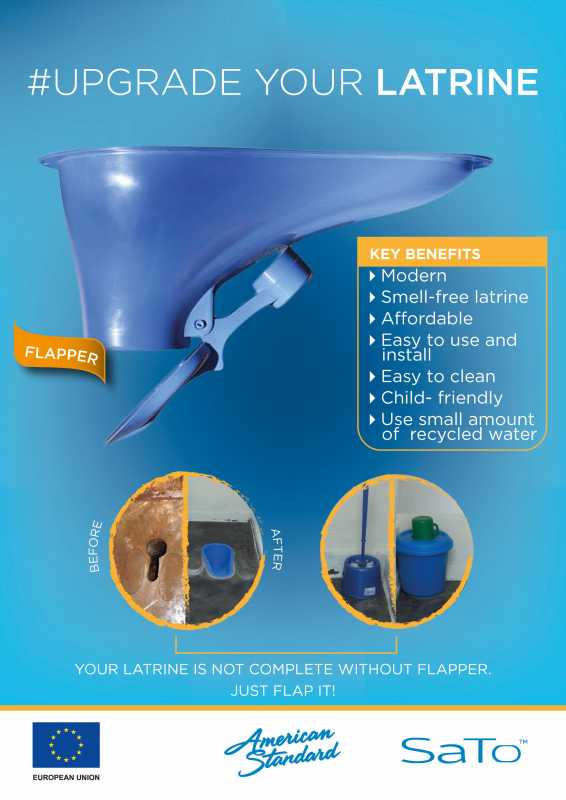- Forum
- categories
- Sanitation systems
- Toilets without urine diversion
- Low flush, pour flush, focus on flushing mechanism
- SaTo pan (flushing mechanism with closing flap)
- Practical and technical questions on use and installation of SaTo pan
Practical and technical questions on use and installation of SaTo pan
37.1k views
- jnmacart
-
Less
- Posts: 8
- Likes received: 4
Re: Practical and technical questions on use and installation of SaTo pan
Jess here with iDE-Bangladesh's WASH team. We have pretty extensive experience with the SaTo pan and are really proud of the way the SaTo was co-developed by ASB and iDE using human centred design principles. You can find the story of the partnership here: designexpo.businessfightspoverty.org/sho...ed-from-safe-toilet/
We have been developing the market around SaTo pans for about 2.5 years now in Bangladesh and I would say we have learned two main things:
1. Subsidies can be done in a way that don't distort the market, but organizations need to think about this from the start. If this isn't thought about before hand it does create market distortions and leaves dealers (who ensure the sustainability of the supply chain) out of the loop. My recommendation is: remember the dealers
2. The value of such a latrine is not inherent to all consumers. the 'tak' sound when the flap closes can be seen as a negative to many consumers, but by turning this to the 'sound of assurance' one is able to convince people of the benefit of a working water seal.
Two design notes to be aware of:
1. Cement should only be filled to the fill line in the cement cup. This is to reduce the sound, but also is the weighted amount from the final design. Most people fill it up to the brim
2. The SaTo can be used on non-cement slabs as we have pilot in a UNICEF funded project SanMark SEAMS in the hill track areas in Bangladesh. If you want some details feel free to contact me.
Please Log in to join the conversation.
You need to login to reply- Arjen
-
Topic Author
- Passionate about WASH, hydrogeology and mapping
Less- Posts: 9
- Karma: 2
- Likes received: 1
Re: Practical and technical questions on use and installation of SaTo pan
Simple examples like this really help!
Arjen
Regional Technical Advisor South Asia
WaterAid
+44 (0) 207 793 4521
This email address is being protected from spambots. You need JavaScript enabled to view it.
Please Log in to join the conversation.
You need to login to reply- stevensugden
-
 Less
Less- Posts: 32
- Karma: 8
- Likes received: 28
Re: Practical and technical questions on use and installation of SaTo pan
This message has an attachment file.
Please log in or register to see it.
Please Log in to join the conversation.
You need to login to reply- nicolag
-

- Sanitation Engineer - Consultant
Less- Posts: 46
- Karma: 4
- Likes received: 13
Re: Practical and technical questions on use and installation of SaTo pan
Please Log in to join the conversation.
You need to login to reply- Arjen
-
Topic Author
- Passionate about WASH, hydrogeology and mapping
Less- Posts: 9
- Karma: 2
- Likes received: 1
Re: Practical and technical questions on use and installation of SaTo pan
Could you share with this group the itemised bill of quantity - and the recommended selling price in US?
Thanks
Regional Technical Advisor South Asia
WaterAid
+44 (0) 207 793 4521
This email address is being protected from spambots. You need JavaScript enabled to view it.
Please Log in to join the conversation.
You need to login to reply- nicolag
-

- Sanitation Engineer - Consultant
Less- Posts: 46
- Karma: 4
- Likes received: 13
Re: Practical and technical questions on use and installation of SaTo pan
We've been wondering about 'productising' latrine superstructures, but I've been warned that the cost all at once is a bit much...hence we take the approach where we sell the BoQ, not the finished product. This allows people time to gather then money to purchase, and then we produce on site. I would love to have some fixed bamboo frames as you do though and sell it as a product.
Nicola
Please Log in to join the conversation.
You need to login to reply- nicolag
-

- Sanitation Engineer - Consultant
Less- Posts: 46
- Karma: 4
- Likes received: 13
Re: Practical and technical questions on use and installation of SaTo pan
Our other big learning point has been about the amount of money that must be spent on marketing. Naively, we underestimated the manpower/marketing required to bring a new product to market.
We find that purchasers in Malawi are drawn in by the cleanliness aspect of the technology, and after a few months of use, cite the reduction in flies as the primary benefit. I'm attaching our marketing flyer in English. Sanitation Solutions in Uganda have also produced nice marketing materials and revised installation guides.
The primary marketing issue is that is so new that it's pretty hard to explain on paper what it is....however, walking around town with one draws a lot of attention!
Attachments:
-
 Flapper_Flyer.jpg
(Filesize: 35KB)
Flapper_Flyer.jpg
(Filesize: 35KB)
Please Log in to join the conversation.
You need to login to replyRe: Practical and technical questions on use and installation of SaTo pan
This message has an attachment file.
Please log in or register to see it.
Please Log in to join the conversation.
You need to login to reply- Elisabeth
-
- User is blocked
- Freelance consultant since 2012
Less- Posts: 3372
- Karma: 54
- Likes received: 932
Re: Practical and technical questions on use and installation of SaTo pan
That's a great idea, thanks for starting this new thread.
The SaTo pan seems to be pretty popular in Uganda, see e.g. the post by Sherina Munyana here . She wrote:
The SaTo pan has proven to be a really popular product for latrine improvement - both in terms of affordability and the benefits of making a latrine more hygienic, free from flies and safe for children. Since October 2014, SSG has sold over 2700 pans. SSG is identifying strategic partners through whom to distribute the pans both in the rural and urban areas which will help to achieve wider scale and impact.
More information about all our products and services can be found on our website www.sanitationsolutionsgroup.com
I also had a chat with Lillian Nabasirye from Uganda at the recent WEDC conference about the SaTo pan. She said she was surprised at how popular they have become with rural people. I have just sent Lillian an e-mail and encouraged her to describe her experiences here on the forum.
I thought that the flap might get soiled quite badly with faeces quite quickly but apparently not so. Either because it is so light that it flaps back at the slightest of weight being added on it. Or because the flushing with water afterwards really helps to keep it clean? (mind you, I would expect that a brush would be needed, too?) Or because the surface is completely non-stick (and some water remains on the flap even when it's closed?)?
Does anyone have photos or videos of a SaTo pan after 12 months of use? What if the users don't use any flushing water with it? How long is it meant to last before a replacement is neeed?
Regards,
Elisabeth
Freelance consultant on environmental and climate projects
Please Log in to join the conversation.
You need to login to reply- Arjen
-
Topic Author
- Passionate about WASH, hydrogeology and mapping
Less- Posts: 9
- Karma: 2
- Likes received: 1
Practical and technical questions on use and installation of SaTo pan
The Sato Pan is being rolled out in many countries and we are all getting experiences in using them. However, I have been missing a forum/topic to discuss practical and technical tips on installing the SaTo pan.* Therefore, I have opened this topic and would like to start by looking for answers for the following:
1) Any experiences to make the slab using any other material than cement (planks?)
2) Can an off-set pit be used with SatoPan? Any experiences with this?
3) Has anybody tried to install them in smaller square slabs produced?
For your information, WaterAid has made a video on how to install a SaTo pan, but we still are looking for answers of the above.
Feel free to add your own questions, share technical manuals and provide answers!
Thank you,
Arjen Naafs
South Asia Regional Technical Advisor WaterAid
+++++++++
* Note by moderator: Another thread about the SaTo pan (describing some funding by the Gates Foundation) is available here:
forum.susana.org/forum/categories/106-us...and-water-for-people
and here in Uganda:
forum.susana.org/forum/categories/87-new...tion-of-susana#13251
Regional Technical Advisor South Asia
WaterAid
+44 (0) 207 793 4521
This email address is being protected from spambots. You need JavaScript enabled to view it.
Please Log in to join the conversation.
You need to login to reply- Forum
- categories
- Sanitation systems
- Toilets without urine diversion
- Low flush, pour flush, focus on flushing mechanism
- SaTo pan (flushing mechanism with closing flap)
- Practical and technical questions on use and installation of SaTo pan








